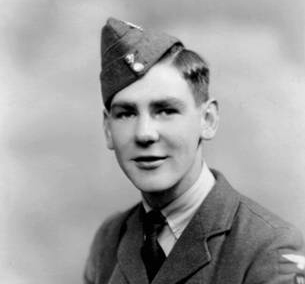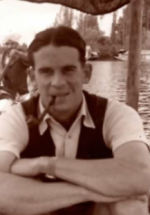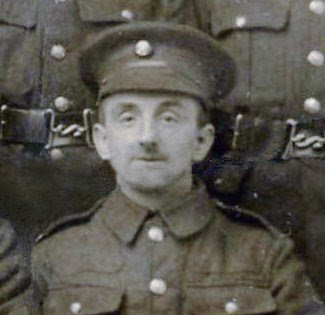April 1943.
Easter Sunday.
Apr. 25. 43. K.H.
Never again in the dusky summer eve;
Never again in the starlit winter night;
Never again in the clear, sweet scented cold, of evenings in early spring;
Or in golden, autumn twilights, after-glow,
Will he rattle the latch of the garden-gate,
Or ever run down the garden path,
That divides the daisied lawn.
Never shake the dew from the spicy-scented stocks,
Or brush the golden dust from the tall Madonna lilies,
Pouring their incense over a summer eve,
Hasting to be within the lamp-lit circle round the hearth.
But, in the silence of the clear dark nights,
When we kneel to the God of Peace,
With no dark curtain ’twixt us and the silver moon and the radiant stars.
We shall commune with him, our spirits shall meet,
And on bended knees we shall give Thanks,
That for a while he dwelt with us and shared our love and life,
Then, gallantly died that we might continue to live.
Free from the fear of a foreign yoke or a dreadful prison camp.
May 5. 43.

Kenneth Hill
The initials following the date of Easter Sunday 1943 appeared to be ‘K.H.’ although not entirely certain. This may have been written as a tribute to Kenneth (Ken) Hill who had been reported missing in action (see 1 Jan. 1943).The son of Will’s brother James (Jim) and widow Grace, he had been a sergeant wireless operator/air-gunner on a Wellington bomber (38 Squadron) lost between 14th and 15th December 1942, aged 19. His Squadron was the same as that of his cousin, Tony (see 28 Jan. 1943), who had been lost earlier (in 1940) before it was relocated to the Near East. Ken would have been remembered in the Easter Sunday service. He is named on memorials in Alamein (Egypt) and in Chapel St Leonards.
Some of the above information is from the Commonwealth War Graves Commission Casualty Register.
The poem has been added to the poems collection on this site. It also appears in the book The Casualties Were Small which contains over twenty of May’s poems as well as selected diary extracts, including those which suggest the background to each poem, accompanied by many nostalgic photographs.



